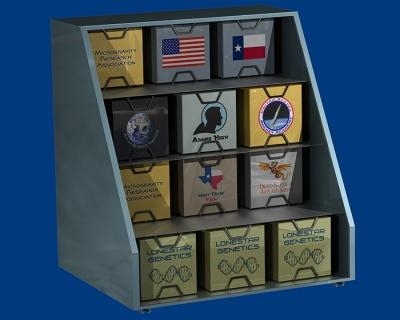Lynx Cub Payload Carrier Being Developed At Texas A&M
A new payload carrier promises to dramatically reduce the cost of access to space for small scientific and education payloads. The Lynx Cub Payload Carrier was announced Thursday by the United States Rocket Academy. The Lynx Cub Carrier will fly on the XCOR Lynx space plane, now under construction at the Mojave Air and Space Port, and carry up to 12 experiments on each flight.

"The Lynx Cub Payload Carrier is a versatile system that installs in the Lynx cabin, behind the pilot's seat, allowing small experiments to be carried as secondary payloads on any Lynx flight," said United States Rocket Academy chairman Edward Wright. "The Cub Carrier can be installed and removed quickly for frequent, low-cost flight opportunities."
Citizens in Space, a project of the United States Rocket Academy, will fly the Lynx Cub Carrier on 10 Lynx missions beginning in late 2014 or early 2015. The Lynx Cub Carrier will also be made available to other XCOR customers, as ready-to-fly hardware or as an open-source hardware design. "XCOR Aerospace is pleased to welcome the new Cub Carrier to the Lynx family," said Khaki Rodway, XCOR Director of Payload Sales and Operations. "The Lynx Cub Carrier is an ideal platform for small materials-processing, fluid-physics, life-science, and engineering experiments. University teaching and research, K-12 education, citizen science, government and industrial R&D will all benefit from the convenient simple interfaces, rapid integration, and affordability of Lynx Cub experiments."
The Lynx Cub Carrier is being developed by the United States Rocket Academy and the Space Engineering Research Center, part of the Texas A&M Engineering Experiment Station (TEES), with support from XCOR Aerospace. Design and fabrication are being done by Texas A&M faculty and students and TEES researchers. "Lynx Cub payloads are based on the popular 1U, 2U, and 3U CubeSat form factors, which are de facto international standards for small scientific payloads," said Chip Hill, Director of the Space Engineering Research Center. "The payload carrier provides physical accommodations, electrical power, and limited thermal control for Lynx Cub experiments."

The Lynx Cub Carrier will be flight-ready in September 2013 and will be included in the XCOR Lynx flight test program. "For the test flights, we will load the Lynx Cub Carrier with payload simulators, accelerometers, gyroscopes, and environmental sensors," Wright said. "While XCOR is proving out the vehicle, we'll be gathering baseline data on the thermal environment, the acoustical environment, acceleration, vibration, etc. – data that will help guide experimenters in their payload design."
"The Space Engineering Research Center has put together a first-class team for this development program," Hill said. "The involvement of Texas A&M industrial and systems engineering students as key team members, under the mentorship of Dr. Justin Yates and direction of technical lead Dr. Frank Little, provides an excellent opportunity for students to gain hands-on experience with real space hardware."
A&M student Cress Netherland said, "Developing the Lynx Cub Carrier presents a challenging and unique problem. We are extremely excited about the opportunity to apply our studies to a real world application."
The Space Engineering Research Center, part of the Texas A&M Engineering Experiment Station in College Station, is also a member of XCOR's global network of payload integrators.
(Lynx Cub Carrier image provided by the United States Rocket Academy)
 ANN's Daily Aero-Linx (04.16.24)
ANN's Daily Aero-Linx (04.16.24) Aero-News: Quote of the Day (04.16.24)
Aero-News: Quote of the Day (04.16.24) Airborne 04.10.24: SnF24!, A50 Heritage Reveal, HeliCycle!, Montaer MC-01
Airborne 04.10.24: SnF24!, A50 Heritage Reveal, HeliCycle!, Montaer MC-01 Airborne 04.12.24: SnF24!, G100UL Is Here, Holy Micro, Plane Tags
Airborne 04.12.24: SnF24!, G100UL Is Here, Holy Micro, Plane Tags Airborne-Flight Training 04.17.24: Feds Need Controllers, Spirit Delay, Redbird
Airborne-Flight Training 04.17.24: Feds Need Controllers, Spirit Delay, Redbird




